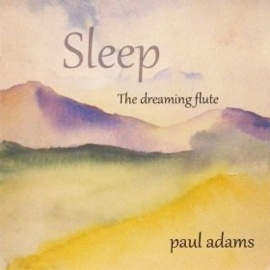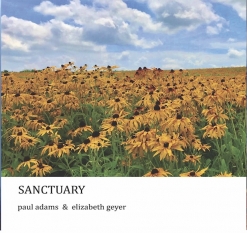
Sleep: The Dreaming Flute
Paul Adams
2012 / Lake Front Productions
60 minutes
Review by Kathy Parsons
Sleep: The Dreaming Flute is Paul Adams’ solo flute exploration of that mysterious necessity of life, sleep. Slow, gentle music soothes the mind and provides an escape from the fast, hectic pace of everyday life. Using about twelve different flutes - each chosen for its “sleepy” character - as well as nature sounds, Adams has created eleven pieces that are both artistic and healing. As Adams explains, making music for healing and maintaining artistic vision can be opposites. In his words: “Music demands tension and release, conflict and resolution. But for some moments, one needs a pure vision of healing. A vision of healing as consistent as the warmth of the sun’s rays. So it is our hope we were able to create moments of healing and stillness in waters that run deep.”
As I usually do, I had Sleep in my wake-up CD player a few mornings in a row to get an idea of what the music was like, and I slept all the way through it on all of those mornings. In many cases, that would be very insulting to the artist, but it seems like an appropriate endorsement for this album. On several other occasions, I had the music playing while I was doing other things, sometimes leaving the music in the background and sometimes tuning in to listen carefully. Sleep provided a wonderful atmosphere for creative thought and letting my mind wander. That I could randomly zero in on the music and listen more carefully says volumes about the quality of the music. Many contemporary artists call their music healing, but, for me, this is the real deal.
There is a consistency in the sound and pace of all of the music on Sleep, so describing individual pieces wouldn’t be too helpful. This is music with a purpose, and Adams’ purpose has succeeded well. As Paul Adams says, this is music for “warm, soft, slow, and peaceful moments.” It provides an unobtrusive background for reading, meditating, daydreaming, working, sleeping, and whatever your imagination suggests. Recommended!
March 20, 2012

with Elizabeth Geyer
2022

